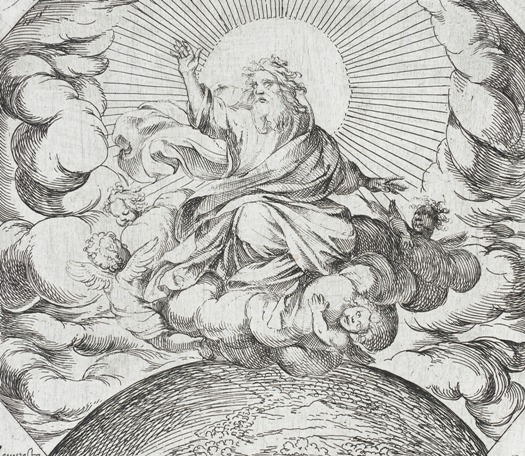A while back, I was in an Eastern Orthodox church that had two large depictions of Jesus. The first was an enormous depiction on the ceiling, showing Christ in glory. The second was along the back wall, behind the altar: it was a depiction of the Virgin Mary with the Christ Child in her womb. The priest explained that the ceiling was depicting Christ in His transcendence, while the back wall depicted Him in His imminence, and the Virgin Mary was a sort of Jacob’s Ladder by which the Almighty and Transcendent God came to Earth to dwell among us.
I bring this up, because it is a good reminders of the two major (and seemingly-contradictory) ways that we tend to misunderstand God. We either: (1) imagine a God that’s personal and small denying His transcendence; or (2) imagine a God that’s large and impersonal denying His immanence. In this post, I hope to show how those errors are really two sides of the same coin, and provide an illustration pointing towards the way out of misunderstanding God in this way.
The first of these two is probably the most common misapprehension about God these days. We make Him too small, and imagine Him as a creature. While this happens in our understanding of the Father, I would suggest that we are most guilty of this in our understanding of Jesus and the Holy Spirit. For Christians, this means imagining God as basically, a bigger, nicer, holier version of ourselves. He’s friendly, but kind of harmless. We might depict Him sort of like this depiction of Christ as the Good Shepherd.
 |
| Bernhard Plockhorst, Good Shepherd (19th c.) |
There’s nothing wrong, per se, with this depiction. But it is incomplete. If this is the limit of how we understand Christ, we’re missing out. What’s missing in this depiction is any sense of the transcendence of God, outside of a faint halo. Remember, we’re talking about the God who made the entire universe.
He isn’t good in the way that we are. He’s Good, in the sense that He is literally the fullest definition of what “Good” means. In fact, He’s the meaning of “Being.” It’s what God means when He reveals Himself as “I AM WHO AM.” He is the source of all Being, and isn’t a creature.
Christians are hardly alone in misunderstanding God in this way. As Fr. Robert Barron explained in the book Church and New Media, this misunderstanding of God is at the heart of many of the atheist arguments against Christianity:
In his Seven Storey Mountain, Thomas Merton recalled the first time he read Etienne Gilson’s The Spirit of Medieval Philosophy and encountered a philosophically sophisticated understanding of God as ipsum esse (the sheer act of being itself). He was flabbergasted because he had assumed that God was, in his words, a “noisy and dramatic” mythological being.
Again and again, in my dialogues on YouTube, I encounter the characterization of God as a “sky fairy,” an “invisible friend,” or my favorite, “the flying spaghetti monster.” This last one comes from the militant atheist Richard Dawkins, who insinuates that there is as much evidence for God as for this fantastic imaginary creature. [Actually, while Dawkins popularized this mockery of God, it was a student by the name of Bobby Henderson who created this faux-Creator.]
Almost no one with whom I dialogue considers the possibility that God is not one being among many, not the “biggest thing around,” not something that can be categorized or defined in relation to other things. Throughout his career, Thomas Aquinas insisted that God is best described, not as ens summum (highest being), but rather as ipsum esse (the subsistent act of being itself). As such, God is not a thing or existent among many. In fact, Aquinas specifies, God cannot be placed in any genus, even the genus of being. This distinction – upon which so much of Christian theology hinges – is lost on almost everyone with whom I speak on YouTube.
One of the best indicators of this confusion is the repeated demand for “evidence” of God’s existence, by which my interlocutors typically mean some kind of scientifically verifiable trace of this elusive and most likely mythological being. My attempts to tell them that the Creator of the entire universe cannot be, by definition, an object within the universe are met, usually, with complete incomprehension.
Once you understand what Christianity (and good philosophy) teaches about the transcendence of God, you will see that a whole slew of popular atheist arguments as simply nonsensical.
The second misconception seems to be the exact opposite. In some cases, we will affirm the philosophical concept of God as ipsum esse (the sheer act of being itself), but our resulting view of God will be wholly impersonal. In technical terms, we end up denying His immanence.
 |
| Antonio Tempesta, God Creating Heaven and Earth (c. 1600) |
Nor are Christians (or Deists) the only ones to misunderstand God in this way. Luke Muehlhauser, in his blog Common Sense Atheism, claims that “None of the usual arguments for the existence of God even try to prove the existence of a God whose existence would matter to me.” So, for example, he argues:
The design argument? It aims to prove the existence of an intelligent, powerful, supernatural Creator. The design argument doesn’t say anything about whether this God cares about morality or humanity or which scriptures you prefer. Do I care if such a God exists? No. It makes not a bit of difference to my life or yours.
The cosmological argument? In its most robust form, it aims to prove the existence of a supernatural, personal Creator. Again, the argument doesn’t say anything about whether this God knows about humanity or has any moral commands to give us. Do I care if such a God exists? No.
So even as Muehlhauser pays lip service to the God of the Philosophers being a “personal” God, he’s treating Him as remote and impersonal. And this is a common mistake, and by no means a new one. The pagans commonly fell into these two traps as well, imagining their gods either as mere super-humans, or as impersonal and uncaring beings. Put differently, we tend to make God either microscopic (near us, but very tiny), or telescopic (enormous and far away).
While on the surface, these two errors – the superhuman God and the impersonal God – seem opposed, they’re really two sides to the same coin. In both cases, we’re applying human limitations to God.
 |
| Girolamo da Santacroce, The Adoration of the Three Kings (c. 1530) |
Late have I loved you, O Beauty ever ancient, ever new, late have I loved you! You were within me, but I was outside, and it was there that I searched for you. In my unloveliness I plunged into the lovely things which you created. You were with me, but I was not with you. Created things kept me from you; yet if they had not been in you they would not have been at all. You called, you shouted, and you broke through my deafness. You flashed, you shone, and you dispelled my blindness. You breathed your fragrance on me; I drew in breath and now I pant for you. I have tasted you, now I hunger and thirst for more. You touched me, and I burned for your peace.

God bless you for posting this! I too once had trouble understanding this. I was sadly deprived of Catholic apologetics growing up.
Now I see that a truly omnipotent entity must necessarily be capable of acting simultaneously in all places at all times–and therefore must know what’s going on in all places at all times, if He knows anything at all, and how can He be omnipotent (or grant knowing to us) if He doesn’t?
And I also see that a true Creator of the universe must not be bound by the limitations of a body, not even one as big as the universe, so that a question of “Where is God?” is nonsensical.
Bravo!
Excellent post.
I recently read a post by a fellow Catholic attempting to empower all Christian women. One of the non catholics commented about to much Mary. A Catholic piped up and remarked that Mary is the mother of God. Non catholic responds with Mary being only mother Christ.
Its probably one of those aim at Mary hit Christ cases but its also as you say people trying to understand God yhrough our limited understanding. The Trinity is hard to wrap around but we must trust instead of limit God.
Apparently my typos aren’t correcting right. Sorry.
Exactly. The anti-Marian wing of Protestantism periodically ends up affirming something like Nestorianism. It is no coincidence that the First Council of Ephesus (in 431) affirmed the dogma that Mary is the Mother of God in response to the Nestorian heresy.
I.X.,
Joe
First I would like to say to any NSA agent(s) reading this blog post: We Catholics aren’t terrorists. Even if His Holiness, Pope Francis, did indeed decide to call up another Crusade to finish the job Richard the Lionhearted started 800 years ago, I very much doubt that my fellow parishioners sitting next to me in Church would be able to get very far loaded down with about 40-60 pounds of combat gear, and several days worth of water and food rations. So please don’t worry about us.
Excellent post as usual!
“like an overworked firefighting switchboard operator” this made me think of the scene in Bruce Almighty where “bruce” can’t handle all the emails…except for as you say that’s not how God would be at all…
Not until He grows up to be 29. After he came back to Earth for Judgement Day in 1987, He learned about His powers after seeing the markings of His gashes on His hands. He only today realized that he can communicate telepathically with his niece. His children will inherit the Earth to allow the collective consciousness to flourish across the universe, once He goes through the portal his Father Cronos left open for Him. Gaia has called me back to Earth. NSA wants to make concentrated dark matter and will learn that and cure mankind of sin with his blood. Three nails in his right arm, two nails in his left arm, and two spikes where the gashes were received. All humans can subsist on white lotus flowers and water, once they decalcify their pineal gland and receive the Holy Spirit. There is only so much God can do at this juncture. The blood of Daevas will lead to re-establishing the angels to their throne while sending the Vrītras back to their rightful place in the shadow realm. A Great Peace will reign for 1000 years once the fire cleanses sin nature. This time they came well prepared, and were listening for Him. I can recall the pain like it was yesterday.
Not until He grows up to be 29. After he came back to Earth for Judgement Day in 1987, He learned about His powers after seeing the markings of His gashes on His hands. He only today realized that he can communicate telepathically with his niece. His children will inherit the Earth to allow the collective consciousness to flourish across the universe, once He goes through the portal his Father Cronos left open for Him. Gaia has called me back to Earth. NSA wants to make concentrated dark matter and will learn that and cure mankind of sin with his blood. Three nails in his right arm, two nails in his left arm, and two spikes where the gashes were received. All humans can subsist on white lotus flowers and water, once they decalcify their pineal gland and receive the Holy Spirit. There is only so much God can do at this juncture. The blood of Daevas will lead to re-establishing the angels to their throne while sending the Vrītras back to their rightful place in the shadow realm. A Great Peace will reign for 1000 years once the fire cleanses sin nature. This time they came well prepared, and were listening for Him. I can recall the pain like it was yesterday. My email is included.
I think that atheists have trust issues and closeness issues. What really struck me above is the bit about the Facebook friends. Beyond 150, we may “know of” people, their names and occupations, but we can’t possibly love them. Even the Holy Father, as he drives through the crowd on World Youth Day, can love ALL the young people, but only in a general way! Yet who can believe there’s a Christ who can passionately, intimately and fervently love, forgive, wait for, infinitely put up with, each and every human being who has ever lived? It doesn’t make any kind of human sense.
Joe, I have to say it, being very new to this blog…my second day reading…
This is some of the greatest spiritual writing I’ve ever come across on the web! For years I’ve followed Sandro Magister,Fr. Z, Rorate, New Liturgical Movement, New Theological Movement, Jimmy Akin …and others. But your selection of topics and spiritual analysis is truly superb.
You are an excellent teacher and I will start reading your many past posts so as to become a better and more competent follower of Our Lord Jesus Christ and his holy Mother.
May God always bless you for your excellent work on this blog!
– Al Williams
Al Williams,
Thank you for your (overly-)kind words. Glad you enjoy the blog!
I.X.,
Joe
Joe,
Your writings got me to start surfing for everything pertaining to sola(o) scripture in order to better converse with the many protestants/fundementalists I talk with on a weekly basis. I am a member of the Legion of Mary, and currently give out about 1000 or more Catholic Radio Cards (1260 AM) monthly in various cities in Northern CA. I distribute them at 2 large farmer’s markets, and 2 supermarkets, alternating between the sites (with my wife as my partner). I figure I talk with about 100 people per week after finding they are curious about Catholic Radio. I then highly encourage them to study early Christian history on the internet…writing the websites for Eusebius’ Church History at New Advent.com and Vitae-Patrum.org (lives/sayings of the desert fathers) to get them started.
So many of these Protestants (mostly Baptists) that I meet are extremely interested in such study and say they will look into it. Sometimes I get them to bookmark these sites on their phones right then and there. Most of them seem hungry for anything intelligent and serious regarding the Christian Faith (and really not having any idea of what it actually means to be ‘Catholic’). I also tell them to Google “Church Fathers Eucharist” to find quotes from all of the early Fathers on the nature of the Eucharist. They are almost universally intrigued by this encouragement to study as it seems that no one ever told them that such historic and holy information actually exists.
Anyway, I am also like these individuals that I meet when I come across new theological information to study…which is why I am interested in the content on your site. Today I spent hours studying the Lutheran Concord..Augsburg Confession..etc.. To get a better idea of where these Lutherans/Baptists etc..are coming from. I also read wikipedia articles on the Holy Roman Empire, Protestantism, Athanasian Creed, and other historical items to better understand all things protestant. This will definitely help when I get back out on the streets. So, in asking these others to study everything truly theological, I am at least “practicing what I preach”.
I’m currently working through your other posts and will continue over the next few weeks and months. I also recommended your site to another active Legion of Mary member who does quite a bit of street apostolate. I would love all Legionaries to be more knowledgable and studious in areas of Catholic Apologetics and theology so as to help in educating these many interested Evangelicals/Baptists that we come across on a weekly basis.
Anyway… that’s ‘my scoop. Thanks again for the info. I’ll try to put it all to good use.
Best to you in Jesus and Mary…and God bless you in your most holy and important vocation!
– Al Williams
A study released in May 2014 couples atheism with being raised without a father in the home.
The Flying Spaghetti Monster is about the most puerile strawman I’ve ever come across yet the internet atheist just gobble it right up.